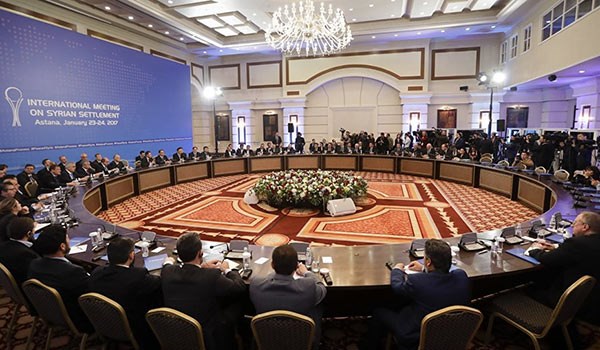
RNA - The deal was signed during the fourth round of the Syria peace talks in the Kazakh capital, Astana, on Thursday.
On Wednesday, Moscow put forward the idea of setting up safe zones in four areas in northern, central and southern Syria, where the most intense fighting is underway between the Syrian government and different militant groups.
The Russian proposal seeks to "put an immediate end to the violence" gripping Syria and "provide the conditions for the safe, [and] voluntary return of refugees,” AFP reported citing a version of the initiative provided by a source close to the opposition.
Kazakh Foreign Minister Kairat Abdrakhmanov has announced that the fifth round of the Astana negotiations would be held in mid-July.
After the agreement was reached, some members of the Syrian opposition delegation shouted in protest and walked out of the Astana talks.
Syria opposition says safe zones plan divides nation
Syria's opposition delegation in Astana said on Thursday that it could not accept creating safe zones in Syria, because the plan threatened the country's territorial integrity.
"We want Syria to maintain its integrity," Opposition delegate Osama Abu Zaid was quoted by Reuters as saying.
He added, "We are against the division of Syria. As for the agreements, we are not a party to that agreement and of course we will never be in favor (of it) as long as Iran is called a guarantor state."
Safe zones bid step toward peace in Syria: UN envoy
Following the signing ceremony, UN Special Envoy for Syria Staffan de Mistura hailed the safe zones plan as a step in the right direction towards real cessation of hostilities in Syria.
"Today in Astana I think we have been able to witness an important promising positive step in the right direction in the process of de-escalation of the conflict," he said.
Syria safe zones key step to consolidate truce: Lavrov
Earlier on Thursday, Russian Foreign Minister Sergei Lavrov underlined the importance of the establishment of de-escalation zones in Syria, saying the initiative could serve as a key step to reinforce the ceasefire in the Arab country.
"A relatively new idea is being discussed in Astana: the formation of de-escalation zones in Syria with the participation of all interested parties and of course [getting] the consent of the Syrian government, which should be an important step toward strengthening the ceasefire," he said after talks with his Finnish counterpart, Timo Soini, in Porvoo.
On Wednesday, Russian President Vladimir Putin said that he had discussed de-escalation zones with Damascus and Tehran as well as his Turkish and US counterparts, Recep Tayyip Erdogan and Donald Trump, respectively.
Elsewhere in his remarks, Lavrov expressed hope that the latest round of UN-brokered Syria talks in the Swiss city of Geneva would be held this month.
‘Russia ready to cooperate with US, Saudi Arabia on Syria’
Also on Tuesday, Russia's Special Envoy on Syria Alexander Lavrentyev expressed Moscow’s readiness to work more closely with the US and Saudi Arabia concerning the Syria crisis.
"Unfortunately, the Americans are still ignoring our attempts to establish closer military cooperation, but we will keep trying," Lavrentyev said.
Accord could resolve 50% of Syria conflict: Erdogan
Erdogan said Thursday that he believed that if the idea of creating “safe zones is implemented, then 50 percent of the Syrian issue can be solved.”
Speaking to Turkish reporters while flying back from the Black Sea resort city of Sochi, Erdogan said de-escalation zones would include Syria's Idlib Province, a part of Aleppo Province, al-Rastan district in Homs Province, and parts of the cities of Damascus and Dara'a.
Since March 2011, Syria has been gripped by militancy it blames on some Western states and their regional allies.
Safe zones include Idlib, Aleppo, Latakia, Homs: Turkey
Meanwhile, Turkey's Foreign Ministry said the Syria safe zones agreement would cover all of Idlib Province, as well as parts of the provinces of Aleppo, Latakia and Homs.
The deal would ban all use of weapons and allow the delivery of humanitarian aid in the aforesaid areas, the ministry added.
847/940